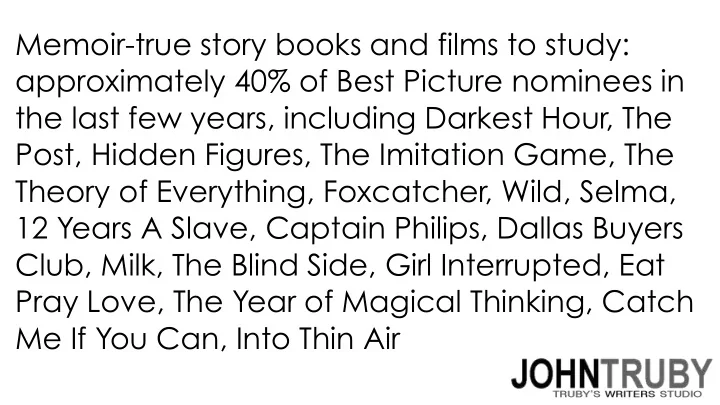

Memoir-true story books and films to study: approximately 40% of Best Picture nominees in the last few years, including Darkest Hour, The Post, Hidden Figures, The Imitation Game, The Theory of Everything, Foxcatcher, Wild, Selma, 12 Years A Slave, Captain Philips, Dallas Buyers Club, Milk, The Blind Side, Girl Interrupted, Eat Pray Love, The Year of Magical Thinking, Catch Me If You Can, Into Thin Air
3. There is typically no single desire line in a person’s real life by which you can track the storyline.
Memoir is much more thematic than all other story forms, which are more concerned with desire line and plot.
Remember: wound is not the weakness. Weakness is the internal flaw that grows from that wound.
Caution: a big danger in memoir is to make your hero – which is you – all good.
This has to be new information that only came to you because you wrote this book.
The storyteller frame puts you in someone’s mind. This allows you total freedom to tell the events in any order you want.
Two advantages: 1. allows you to compress the story and get rid of dead space, 2. you can unify the desire lines.
We know from drama that the intimate opponent is the most powerful opponent of all because they can do more damage than any other.
The biggest problem you face in memoir-true story is lack of plot.
Because the hero in a memoir is yourself, reveals are often mini self-revelations.
Key point: many reveals in memoir are about understanding events differently now than when you first experienced them.
Memoir is not about returning to your past, it’s about changing your future.
Assignment for next class IF YOU ARE WRITING SCENES FOR YOUR STORY: 1. write the next three scenes in the story where there is dialogue That means three scenes, not three chapters. Be sure to start by listing the premise in 1 line
Assignment for next class IF YOU ARE WRITING SCENES FOR YOUR STORY: 2. write your hero’s weakness in 1 line 3. write the endpoint of your hero’s character change, In other words, his or her self-revelation
IF YOUR STORY IS AT ANY OTHER STEP OF THE WRITING PROCESS 4. Important: state which assignment you are doing 5. follow the instructions for that month’s assignment Don’t hand in more than the assignment asks for.
IF YOUR STORY IS AT ANY OTHER STEP OF THE WRITING PROCESS 6. send in any question you have about story in general or about your story in particular
Remember: hand in only 1 assignment at a time.
Next class: Wednesday, February 20
Recommend
More recommend